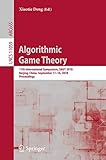Algorithmic Game Theory [electronic resource] : 11th International Symposium, SAGT 2018, Beijing, China, September 11-14, 2018, Proceedings / edited by Xiaotie Deng.
Contributor(s): Deng, Xiaotie [editor.] | SpringerLink (Online service)
| SpringerLink (Online service) .
.
Material type:  BookSeries: Information Systems and Applications, incl. Internet/Web, and HCI: 11059Publisher: Cham : Springer International Publishing : Imprint: Springer, 2018Edition: 1st ed. 2018.Description: XX, 276 p. 29 illus. online resource.Content type: text Media type: computer Carrier type: online resourceISBN: 9783319996608.Subject(s): Computer simulation
BookSeries: Information Systems and Applications, incl. Internet/Web, and HCI: 11059Publisher: Cham : Springer International Publishing : Imprint: Springer, 2018Edition: 1st ed. 2018.Description: XX, 276 p. 29 illus. online resource.Content type: text Media type: computer Carrier type: online resourceISBN: 9783319996608.Subject(s): Computer simulationOn Revenue Monotonicity in Combinatorial Auctions -- An Update on the Price of Stability -- Correlation-Robust Mechanism Design -- Job Security, Stability and Production Efficiency, with Applications to Auctions -- A Near Optimal Mechanism for Energy Aware Scheduling -- Information Elicitation for Bayesian Auctions -- The Complexity of Cake Cutting with Unequal Shares -- Resource Based Cooperative Games: Optimization, Fairness and Stability -- Coreness of Cooperative Games with Truncated Submodular Profit Functions -- Strategic Contention Resolution in Multiple Channelswith Limited Feedback -- Simple Games Versus Weighted Voting Games -- Hide and Seek Game with Multiple Resources -- An Improved Envy-Free Cake Cutting Protocol for Four Agents -- A Truthful Mechanism for Interval Scheduling -- On Revenue-Maximizing Mechanisms Assuming Convex Costs -- The Communication Burden of Single Transferable Vote, in Practice -- On the Price of Stability of Social Distance Games -- Schelling Segregation withStrategic Agents -- Efficient Rational Proofs with Strong Utility-Gap Guarantees -- Removal and Threshold Pricing: Truthful Two-sided Markets with Multi-dimensional Participants -- A Two-Stage Mechanism for Ordinal Peer Assessment -- Mechanism Design for Two-Opposite-Facility Location Games with Penalties on Distance -- The Equilibrium Existence of a Robust Routing Game Under Interval Uncertainty -- Online Trading as a Secretary Problem -- Constrained Swap Dynamics over a Social Network in Distributed Resource Reallocation -- A Hashing Power Allocation Game in Cryptocurrencies among Risk Neutral Miners -- What is the Optimal Deferral Number in Waitlist Mechanism -- An Optimal Strategy for Static Black-Peg Mastermind With Three Pegs -- Tight Bounds on the Relative Performances of Pricing Mechanisms in Storable Good Markets.
This book constitutes the refereed proceedings of the 11th International Symposium on Algorithmic Game Theory, SAGT 2018, held in Beijing, China, in September 2018. The 19 full papers presented together with 6 short papers and 5 plenary talks were carefully reviewed and selected from 54 submissions. The papers cover various important aspects of algorithmic game theory including market equilibrium, auctions and applications, two sided markets, cake-cutting, cooperative games, voting games, multi-agent scheduling, price of stability, various mechanism design problems: online-dynamics and multi-stages as well as revenue maximization and resource allocation and applications.


There are no comments for this item.